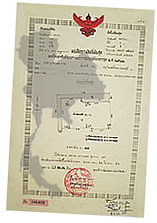Due diligence
lawyer's real estate checklist
Whether you lease land or purchase real property in Thailand, the property ownership title deed needs close scrutiny. The seller must be able to identify himself as the owner and provide complete certified copies of the documents of the land, land and house or condominium unit (e.g. a copy of the office government issued ownership's title deed front and back side, the previous land office sale agreement and other relevant documents). When the property includes a house the seller must submit a copy of the house book and building permit or previous sale agreement confirming his ownership.

 Inheritance Laws
Inheritance Laws